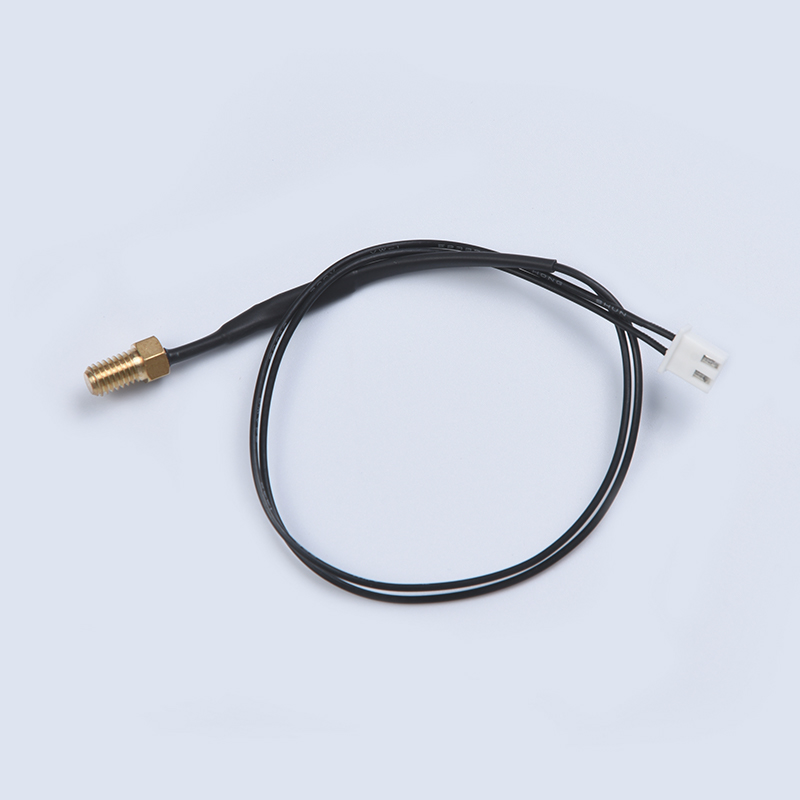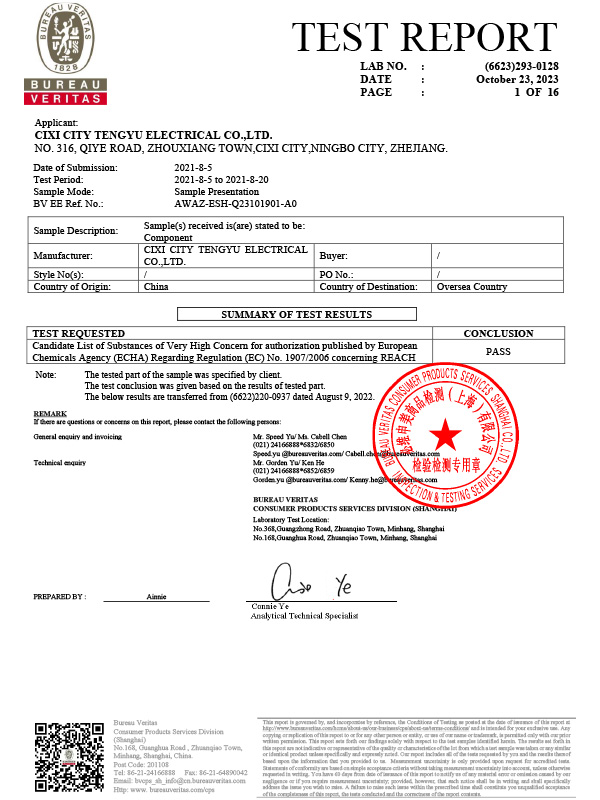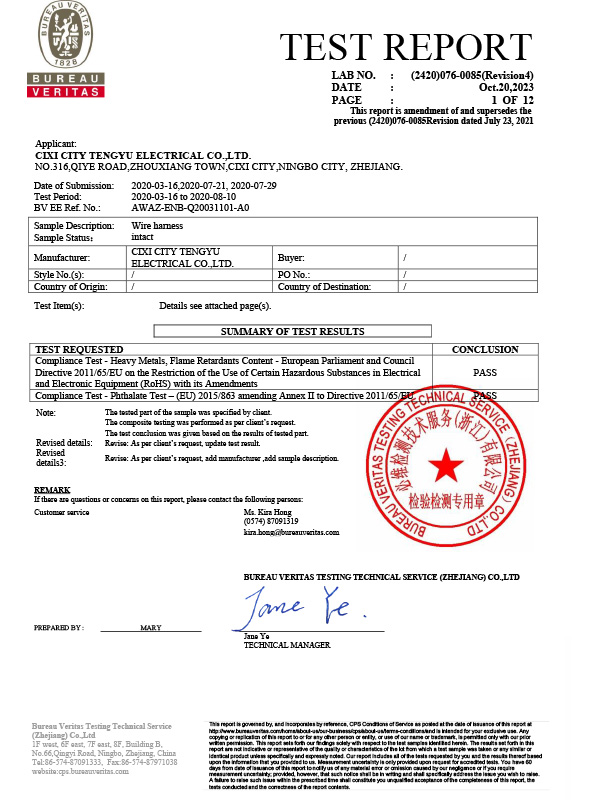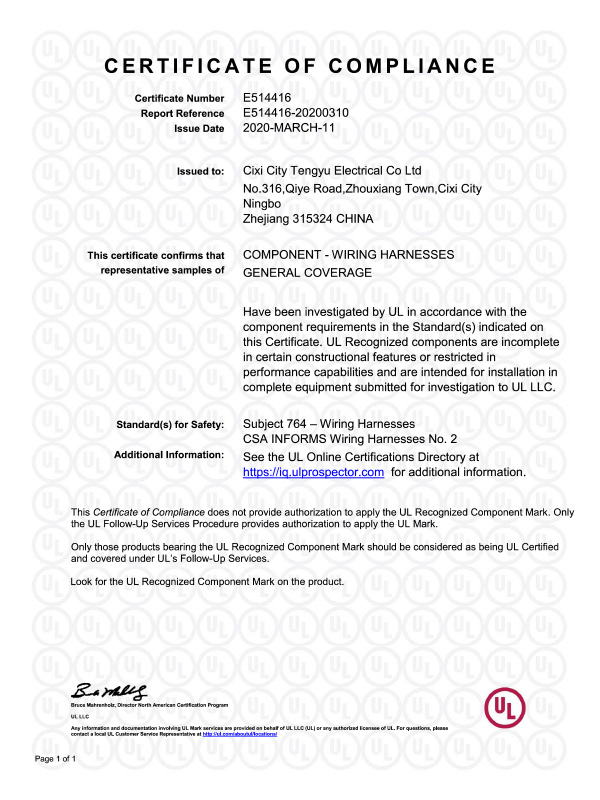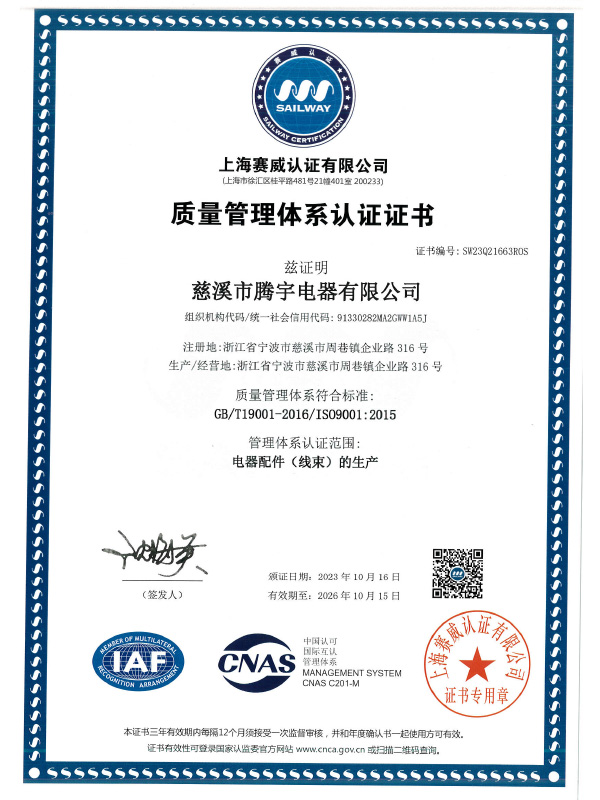How does a food processor NTC temperature sensor work?
Introduction to Food Processor NTC Temperature Sensors
A food processor NTC temperature sensor is a specialized component designed to monitor and regulate temperature within food processors. Unlike general-purpose sensors, this type is engineered to meet the specific needs of food preparation, including motor protection, food safety, and system reliability. The principle of the NTC sensor, meaning “Negative Temperature Coefficient,” lies in its ability to reduce resistance as temperature rises. This feature enables the food processor to detect temperature variations in real time and take corrective measures such as adjusting motor speed or shutting down to prevent overheating. Teng Yu Electrical Appliance, after more than twenty years of development, has mastered advanced production technology and a scientific management system that ensures its food processor NTC temperature sensors meet global quality requirements.
Working Principle of a Food Processor NTC Temperature Sensor
The food processor NTC temperature sensor functions by converting temperature changes into measurable resistance variations. When the motor or food ingredients inside the processor generate heat, the sensor detects the change. The resistance of the NTC sensor decreases proportionally with rising temperature. The appliance’s control unit interprets this signal and translates it into temperature data. This information allows the food processor to regulate its operation, protecting internal components from heat damage and ensuring consistent food processing results. Teng Yu Electrical integrates strict quality controls in the production of these sensors, making them reliable for continuous operation in demanding kitchen environments.
Key Applications in Food Processors
The food processor NTC temperature sensor serves multiple purposes within the appliance. Its primary function is motor protection, ensuring the motor does not overheat during extended blending, chopping, or grinding tasks. Another critical application is monitoring food safety, especially when certain ingredients require temperature-sensitive processing. For multifunctional processors, the sensor ensures balanced performance by providing accurate feedback for temperature management. Teng Yu Electrical, guided by its philosophy of “people-oriented, innovation leads to development,” designs its sensors to fulfill these requirements effectively and reliably in different models of food processors.
Benefits of Using Food Processor NTC Temperature Sensors
Food processor NTC temperature sensors offer specific benefits to appliance performance. They provide rapid response to temperature changes, which is essential for preventing damage to delicate components. Their small size makes them easy to integrate into compact processor designs without interfering with food preparation. In addition, their durability ensures long-term stability even under frequent use. Teng Yu Electrical’s sensors, supported by experienced research and development teams, achieve a balance of cost efficiency, precision, and reliability, giving manufacturers confidence in their integration.
Comparison of Temperature Sensing Solutions in Food Processors
Food processors can employ different temperature sensing technologies, but NTC sensors remain the most common due to their cost-effectiveness and sensitivity. RTDs and thermocouples are alternatives but often unnecessary for the temperature ranges typical in household food processors.
| Sensor Type |
Sensitivity in Food Processors |
Cost Level |
Temperature Range |
Suitability for Food Processors |
| Food Processor NTC Sensor |
High |
Low |
-40°C to 150°C |
Ideal for motor and food monitoring |
| RTD |
Medium |
Medium to High |
-200°C to 600°C |
Excess capacity, not cost-effective |
| Thermocouple |
Medium |
Medium |
-200°C to 1200°C |
Overdesigned for household use |
This comparison highlights why food processor NTC temperature sensors are the preferred solution for appliance manufacturers.
Integration of Food Processor NTC Temperature Sensors
Successful integration of food processor NTC temperature sensors depends on correct placement and secure connectivity. Sensors are often placed near the motor to monitor heat buildup, or in positions where food contact requires precise temperature measurement. Compliance with safety regulations ensures that food-contact sensors meet hygiene standards. Teng Yu Electrical leverages its internationally advanced production technology to produce sensors compatible with diverse processor designs. Its fast delivery system also supports large-scale production, helping manufacturers meet global demand.
Production Quality and Process Control
To ensure stable and reliable performance, the production of food processor NTC temperature sensors requires strict control over materials, assembly, and testing. Teng Yu Electrical has established a scientific management system to oversee every stage of the manufacturing process. Senior professionals specializing in research, production, and quality management ensure that each sensor is tested against resistance-temperature curves and other performance benchmarks. This systematic process allows the company to provide sensors that are trusted and praised by customers both domestically and abroad.
Durability and Reliability of Food Processor NTC Temperature Sensors
Durability is an essential requirement because food processors are subject to repeated use. A food processor NTC temperature sensor must withstand not only heat cycles but also exposure to vibration and moisture within the appliance. By employing robust protective housings and advanced insulation techniques, Teng Yu Electrical designs sensors with consistent long-term performance. This helps reduce maintenance requirements and enhances the overall reliability of the food processor.
Customer Service and Technical Support in Sensor Application
Beyond providing sensors, Teng Yu Electrical offers integration support and technical consultation for appliance manufacturers. The company’s sales and service teams collaborate with clients to recommend the best sensor design for specific processor models. Training and technical documents further support customers during sensor installation and application. This approach reflects Teng Yu Electrical’s adherence to providing not just products but also reliable service, helping its clients succeed in competitive markets.
Future Development Trends in Food Processor NTC Sensors
As food processors become more intelligent and connected, the role of food processor NTC temperature sensors will expand. These sensors will likely be integrated into smart systems capable of transmitting real-time data to mobile applications or cloud platforms. Such advancements will allow users to monitor processing conditions remotely, ensuring food quality and safety. Teng Yu Electrical, with its continuous innovation strategy, is actively preparing to support these technological trends by advancing sensor compatibility with next-generation appliances.
What is the primary function of a food processor NTC temperature sensor?
Introduction to the Role of Food Processor NTC Temperature Sensors
A food processor NTC temperature sensor is a specialized component designed to monitor and regulate temperature in household and commercial food processors. Its primary function is to ensure that the appliance operates within safe thermal limits, protecting both the motor and the processed food from undesirable conditions. The term “NTC” stands for Negative Temperature Coefficient, which refers to the sensor’s fundamental characteristic of decreasing resistance as temperature rises. This property makes it highly suitable for precise monitoring within the operating range of food processors. Teng Yu Electrical Appliance, after more than two decades of continuous development, integrates internationally advanced production technology and a scientific management system to deliver NTC temperature sensors that meet the growing demands of global markets.
Understanding the Primary Function in Food Processors
The primary function of a food processor NTC temperature sensor is to provide accurate temperature feedback to the appliance’s control system. This allows the system to detect overheating in the motor, manage power distribution, and prevent potential damage. At the same time, it ensures that food being processed does not reach unsafe or undesirable temperatures that may affect quality. In multifunctional appliances where blending, grinding, and kneading occur, consistent temperature monitoring enhances both performance and safety. Teng Yu Electrical Appliance integrates strict quality controls during production, ensuring that each food processor NTC temperature sensor fulfills its primary role effectively across different applications.
Working Principle Related to Its Function
The working principle of the food processor NTC temperature sensor is directly tied to its primary function. As the motor or processing chamber heats up, the sensor’s resistance decreases. The appliance’s electronic circuit converts this resistance change into a temperature reading, which is then used to adjust the operation of the food processor. If the motor temperature exceeds safe levels, the system may reduce speed, adjust power, or shut down temporarily. This mechanism prevents overheating, safeguards the motor, and ensures long-term reliability. Teng Yu Electrical Appliance applies a scientific management system to ensure that the resistance-temperature characteristics of its sensors remain consistent, providing reliable temperature monitoring for food processors.
Applications Demonstrating the Primary Function
The primary function of the food processor NTC temperature sensor can be observed in multiple scenarios. For example, during extended blending or grinding, the sensor continuously monitors motor heat to prevent overload. In dough kneading, where resistance on the motor is high, the sensor ensures the appliance does not exceed safe operating temperatures. In models with heating functions, the sensor monitors food chamber conditions to maintain consistent processing results. By supplying these sensors, Teng Yu Electrical Appliance contributes to safer and more efficient food processing equipment, aligning with its philosophy of “people-oriented, innovation leads to development.”
Comparison with Other Temperature Control Methods
While other technologies such as RTDs and thermocouples exist, the primary function of monitoring food processor conditions is most effectively fulfilled by NTC sensors. This is because they provide rapid response within the operational range of household appliances, are compact, and offer cost advantages.
| Technology |
Sensitivity in Food Processors |
Cost Level |
Typical Use Case |
Suitability for Primary Function |
| NTC Sensor |
High within -40°C to 150°C |
Low |
Motor and food monitoring |
Highly suitable |
| RTD |
Medium |
Medium to High |
Industrial applications |
Less common in household processors |
| Thermocouple |
Medium |
Medium |
High-temperature environments |
Overdesigned for food processors |
This comparison underlines why food processor NTC temperature sensors are the most practical choice for fulfilling the primary function of thermal monitoring in such appliances.
Integration in Food Processor Design
Integration of a food processor NTC temperature sensor requires careful design to maximize its primary function. Placement near the motor ensures that the sensor detects heat buildup promptly. In advanced models with heating features, additional sensors may be positioned near the food chamber to regulate processing temperatures. Teng Yu Electrical Appliance leverages internationally advanced production techniques to deliver sensors that are compatible with diverse food processor designs. Its rapid delivery capability ensures that manufacturers can integrate these sensors smoothly into production lines, meeting market demand efficiently.
Production Quality Ensuring the Primary Function
The effectiveness of the food processor NTC temperature sensor in fulfilling its primary function relies on high production quality. Teng Yu Electrical Appliance applies strict process control, beginning with material selection and extending to final testing. Each sensor undergoes validation against resistance-temperature performance curves to ensure that its response is accurate and reliable. Senior technical personnel in research, production, and quality management work together to guarantee that every sensor meets the functional requirements of the appliance. This level of oversight provides assurance to customers both domestically and abroad.
Durability Supporting the Primary Function
The primary function of the food processor NTC temperature sensor can only be sustained through durable design. Food processors experience frequent use, vibration, and varying environmental conditions. To address these challenges, sensors produced by Teng Yu Electrical Appliance incorporate protective housings and insulation structures that maintain stability under stress. By focusing on durability, the company ensures that the primary function of thermal monitoring remains reliable throughout the appliance’s lifespan, reducing the need for frequent replacement or maintenance.
Customer Service Enhancing Sensor Application
Delivering sensors is only part of fulfilling their primary function. Customer support ensures that appliance manufacturers can integrate and apply food processor NTC temperature sensors effectively. Teng Yu Electrical Appliance provides technical consultation, application guidance, and after-sales support to ensure that its sensors deliver reliable performance in real-world use. This approach reflects the company’s commitment to offering not just qualified products but also quality service, reinforcing its long-term vision of building a trusted global brand.
Future Developments Expanding the Primary Function
In the future, the primary function of food processor NTC temperature sensors will expand with advancements in smart appliance technology. Sensors may connect to digital systems for real-time monitoring, predictive maintenance, and energy optimization. By combining traditional thermal protection with smart integration, these sensors will enhance safety and efficiency further. Teng Yu Electrical Appliance, with its ongoing investment in research and innovation, is prepared to support these trends by developing sensors tailored for intelligent food processors, ensuring that their primary function remains central to future designs.




 中文简体
中文简体